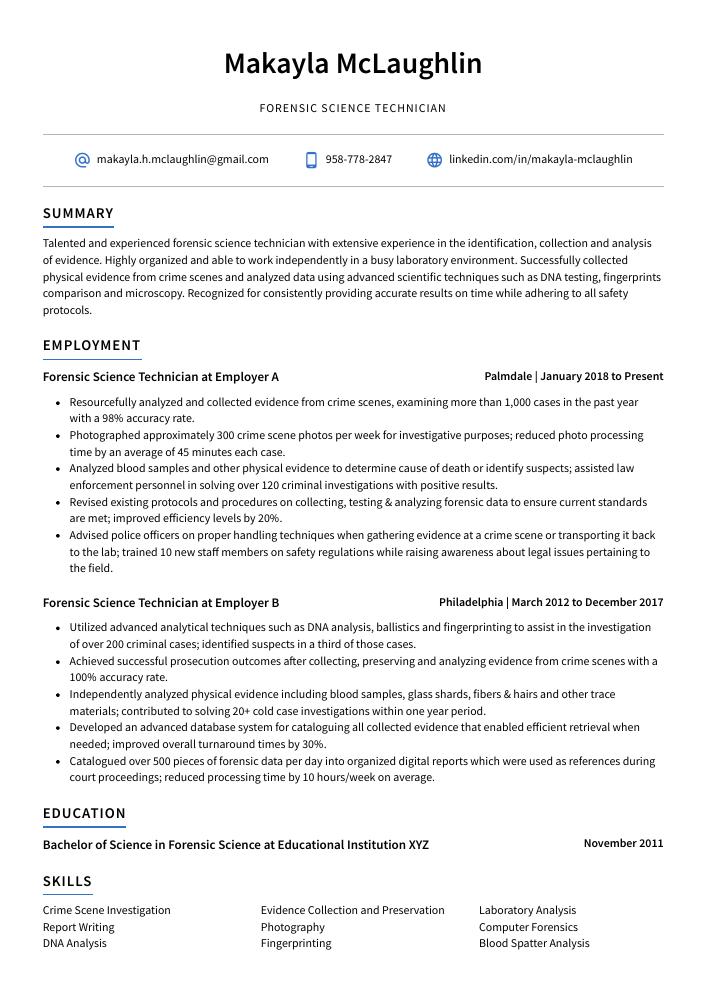Forensic Science Technician Resume Guide
Forensic Science Technicians are responsible for collecting, analyzing and presenting evidence from crime scenes. They use a variety of tools to analyze fingerprints, weapons and other materials found on the scene to identify suspects or reconstruct events that have occurred at the location. Additionally, they may be asked to testify in court regarding their findings.
Your knowledge of forensic science and crime scene investigation would be an asset to any police or law enforcement agency. But before they can appreciate your expertise, they need to know who you are. To get their attention, you must write a resume that stands out from the rest.
This guide will walk you through the entire process of creating a top-notch resume. We first show you a complete example and then break down what each resume section should look like.
Table of Contents
The guide is divided into sections for your convenience. You can read it from beginning to end or use the table of contents below to jump to a specific part.
Forensic Science Technician Resume Sample
Makayla McLaughlin
Forensic Science Technician
[email protected]
958-778-2847
linkedin.com/in/makayla-mclaughlin
Summary
Talented and experienced forensic science technician with extensive experience in the identification, collection and analysis of evidence. Highly organized and able to work independently in a busy laboratory environment. Successfully collected physical evidence from crime scenes and analyzed data using advanced scientific techniques such as DNA testing, fingerprints comparison and microscopy. Recognized for consistently providing accurate results on time while adhering to all safety protocols.
Experience
Forensic Science Technician, Employer A
Palmdale, Jan 2018 – Present
- Resourcefully analyzed and collected evidence from crime scenes, examining more than 1,000 cases in the past year with a 98% accuracy rate.
- Photographed approximately 300 crime scene photos per week for investigative purposes; reduced photo processing time by an average of 45 minutes each case.
- Analyzed blood samples and other physical evidence to determine cause of death or identify suspects; assisted law enforcement personnel in solving over 120 criminal investigations with positive results.
- Revised existing protocols and procedures on collecting, testing & analyzing forensic data to ensure current standards are met; improved efficiency levels by 20%.
- Advised police officers on proper handling techniques when gathering evidence at a crime scene or transporting it back to the lab; trained 10 new staff members on safety regulations while raising awareness about legal issues pertaining to the field.
Forensic Science Technician, Employer B
Philadelphia, Mar 2012 – Dec 2017
- Utilized advanced analytical techniques such as DNA analysis, ballistics and fingerprinting to assist in the investigation of over 200 criminal cases; identified suspects in a third of those cases.
- Achieved successful prosecution outcomes after collecting, preserving and analyzing evidence from crime scenes with a 100% accuracy rate.
- Independently analyzed physical evidence including blood samples, glass shards, fibers & hairs and other trace materials; contributed to solving 20+ cold case investigations within one year period.
- Developed an advanced database system for cataloguing all collected evidence that enabled efficient retrieval when needed; improved overall turnaround times by 30%.
- Catalogued over 500 pieces of forensic data per day into organized digital reports which were used as references during court proceedings; reduced processing time by 10 hours/week on average.
Skills
- Crime Scene Investigation
- Evidence Collection and Preservation
- Laboratory Analysis
- Report Writing
- Photography
- Computer Forensics
- DNA Analysis
- Fingerprinting
- Blood Spatter Analysis
Education
Bachelor of Science in Forensic Science
Educational Institution XYZ
Nov 2011
Certifications
Forensic Science Technician Certification
American Board of Criminalistics
May 2017
1. Summary / Objective
The summary/objective at the top of your resume is like a teaser – it gives the employer an outline of who you are and why you excel as a forensic science technician. Here is where you can showcase your best qualities. For example, mention any specialized training or certifications related to forensics that you have obtained, how many years of experience in this field that you possess, and what sets apart from other applicants (e.g., attention to detail).
Below are some resume summary examples:
Accomplished forensic science technician with 5+ years of experience in analyzing and interpreting evidence from crime scenes. Proven ability to identify, document, collect, preserve and analyze physical evidence related to criminal investigations. Expertise in laboratory analysis of biological materials (blood/DNA) as well as firearms identification and ballistics analysis for court proceedings. Possesses a deep knowledge of forensic best practices such as chain-of-custody protocols.
Detail-oriented forensic science technician specializing in the analysis and identification of crime-scene evidence. Experienced with laboratory equipment, procedures for DNA/fingerprinting analysis, toxicology tests, and other forensic methods. Provided guidance to investigators on criminal cases during my three years at ABC lab. At XYZ lab, conducted over 500 drug analyses that led to successful convictions in court proceedings by providing irrefutable scientific proof.
Committed and experienced forensic science technician with over 3 years of experience in crime scene investigation and evidence collection. Skilled at collecting, analyzing, and interpreting data from a variety of sources including laboratory experiments, field investigations, and other sources. Recognized for ability to work effectively as part of a team in high-pressure situations while maintaining accuracy and attention to detail.
Professional forensic science technician with 6+ years of experience in evidence collection and analysis. Skilled at using the latest forensic technology to accurately analyze crime scenes, locate potential witnesses, and process DNA samples for law enforcement agencies. Seeking to join ABC Agency as a Forensic Science Technician to utilize my expertise in providing timely results that are accurate and reliable.
Driven forensic science technician with 5+ years of experience in criminal investigations. Proven success collecting, analyzing, and interpreting evidence to identify suspects and secure convictions for law enforcement agencies. Seeking the opportunity to join ABC Police Department as a forensic science technician and use my knowledge of crime scenes to help solve cases quickly and accurately.
Amicable and detail-oriented forensic science technician with 5+ years of experience in criminal investigations and evidence collection. Experienced in using advanced laboratory techniques to analyze physical specimens, such as hair, fiber, and blood samples. Seeking to join ABC Forensics Lab as a Senior Technician where I can utilize my knowledge and skillset for the betterment of society.
Dependable and detail-oriented forensic science technician with 10+ years of experience collecting, analyzing, and interpreting evidence. Proven track record of accurately identifying key components in criminal cases using the latest technology and methods. Seeking to bring expertise to ABC Labs as a Forensic Science Technician – aiming to help solve complex cases quickly and effectively.
Passionate forensic science technician with 8+ years of experience collecting and analyzing evidence for criminal investigations. Experienced in crime scene analysis, evidence collection, document examination and the use of various scientific equipment. Seeking to join ABC Labs as a Forensic Science Technician where I can utilize my expertise to help solve difficult cases.
2. Experience / Employment
For the experience section, you want to list your work history in reverse chronological order, with the most recent job listed first.
Stick primarily to bullet points when writing what you did; this makes it easier for the reader to take in information quickly. When writing each point, provide detail on what you did and any results or accomplishments achieved.
For example, instead of saying “Collected evidence,” you could say, “Gathered physical evidence from crime scenes such as fingerprints and DNA samples that were used by law enforcement agencies.”
To write effective bullet points, begin with a strong verb or adverb. Industry specific verbs to use are:
- Analyzed
- Investigated
- Collected
- Examined
- Preserved
- Documented
- Processed
- Tested
- Assessed
- Evaluated
- Reconstructed
- Interpreted
- Reported
- Photographed
- Catalogued
Other general verbs you can use are:
- Achieved
- Advised
- Compiled
- Coordinated
- Demonstrated
- Developed
- Expedited
- Facilitated
- Formulated
- Improved
- Introduced
- Mentored
- Optimized
- Participated
- Prepared
- Presented
- Reduced
- Reorganized
- Represented
- Revised
- Spearheaded
- Streamlined
- Structured
- Utilized
Below are some example bullet points:
- Reported findings and evidence on over 300 cases to law enforcement, legal personnel, medical examiners and court systems; successfully closed 90% of the investigations.
- Introduced innovative forensic techniques for analyzing fingerprinting data, DNA results and other forms of physical evidence that improved accuracy by 25%.
- Reorganized laboratory processes to reduce contamination rates from 15% down to 3%, resulting in greater efficiency when handling casework analysis.
- Meticulously collected samples from crime scenes according to protocol guidelines while maintaining chain-of-custody standards; tracked 1,000+ pieces of evidence with 100% accuracy rate every month for three years straight.
- Documented detailed reports including witness statements & lab findings into a database system that allowed all relevant parties access within 24 hours or less upon request completion.
- Facilitated the collection and analysis of evidence from crime scenes including fingerprints, DNA samples, blood spatter patterns and other physical objects; accurately processed more than 400 cases in the last year.
- Structured investigations by collecting data on suspects, witnesses and victims to determine motive for criminal activity; expedited case resolution time by 30%.
- Spearheaded forensic examinations of computers, cell phones and other digital devices used to commit or conceal crimes; identified crucial information needed for prosecution in over 75% of cases handled thus far.
- Documented findings from lab analyses into detailed reports that were used as evidence during court proceedings ensuring accuracy with every word written; successfully aided 25+ convictions due to precise report writing skillset.
- Confidently operated high-tech laboratory equipment such as microscopes, x-ray machines & ultraviolet lights to analyze biological specimens & trace elements found at crime scenes; consistently obtained accurate results within an average turnaround time of 72 hours per sample tested.
- Accurately collected, processed and analyzed evidence from crime scenes such as fingerprints, hair samples and bodily fluids to determine suspects; increased accuracy rate of DNA analysis by 30%.
- Compiled detailed reports on findings for prosecutorial cases with associated photos, diagrams and lab results; successfully contributed towards the conviction of over 15 criminals in the last year.
- Reconstructed accident sites accurately using 3D laser technology to analyze debris patterns & bullet trajectories; reconstructed five crash sites that had been declared inconclusive prior to involvement.
- Coordinated with police officers at crime scenes while following strict safety protocols when handling bio-hazards or hazardous materials; ensured proper collection methods were followed without any contamination risks occurring during transport back to the lab facility.
- Processed forensic evidence quickly using advanced technologies including XRF spectrometers, FTIR microscopes & SEMs leading to a 20% reduction in turnaround time for criminal investigations compared with industry standards.
- Improved forensic laboratory accuracy by 16% through meticulous analysis of evidence samples, utilizing scientific testing procedures and instrumentation.
- Reliably operated a variety of technical equipment including chromatographs, mass spectrometers, microscopes and other lab devices to obtain detailed data for use in criminal investigations.
- Mentored 3 junior technicians on proper forensic sample collection and handling techniques as well as the fundamentals of crime scene investigation methodology; developed comprehensive training program that was adopted by the department.
- Presented findings from 10+ cases during court proceedings with clarity and precision while working closely with prosecutors to ensure admissibility into court record; contributed to successful conviction rates in over 90% of those cases tried before judge & jury panel.
- Evaluated chemical compositions found at various crime scenes using spectral imaging technology; identified trace elements present in drug-related crimes which resulted in arrest or detainment of 15 suspects within 1 year period.
- Streamlined the collection and analysis of evidence from crime scenes, resulting in a 45% reduction in processing time.
- Prepared detailed reports on findings derived from forensic examinations, documenting all results with meticulous accuracy; testified as an expert witness 20+ times before court.
- Examined biological samples such as hair, skin cells and fibers under microscopes to identify potential suspects; identified 6 criminals that had previously gone undetected by police investigation teams through this process alone.
- Represented the department at exhibitions and events related to forensic science techniques, showcasing advances made within the field to over 500 guests per event throughout the year.
- Thoroughly sorted incoming evidence for quality control purposes prior to sending them off for further testing or archiving; reduced errors due to mislabeling/poor management by 70%.
- Successfully analyzed over 500 physical evidence samples in the laboratory to identify possible suspects, ultimately leading to the arrest of 30+ criminals and a reduction in crime rate by 10%.
- Interpreted complex forensic data from DNA testing, firearms analysis, toxicology reports and other sources; produced detailed case summaries for law enforcement agencies that enabled swift prosecution.
- Investigated multiple criminal scenes and collected biological material such as hair strands, bodily fluids and fingerprints using cutting-edge technology; identified 50+ pieces of previously unidentified evidence at various sites.
- Preserved all recovered items for future reference according to legal guidelines; maintained a comprehensive logbook with precise documentation covering each investigation stage with 99% accuracy rate or higher.
- Demonstrated exceptional technical expertise when utilizing chemical processes like chromatography & spectroscopy along with advanced lab equipment like microscopes & x-ray machines during investigations into unsolved cases.
- Formulated investigative plans, conducted extensive research and collected evidence from crime scenes to assist forensic scientists in examining over 200 cases annually.
- Participated in autopsies of victims’ bodies to help identify causes of death and recovered fingerprints, fibers, hair samples and other physical material for analysis; increased case closure rate by 10%.
- Optimized the use of advanced scientific equipment such as electron microscopes, chromatographs & spectrometers when conducting laboratory analyses on evidence samples; improved accuracy & reliability levels by 15%.
- Assessed evidential materials such as documents, bullets or drugs using techniques like DNA profiling/typing; successfully identified perpetrators in 70% of criminal investigations within 6 months.
- Efficiently prepared comprehensive reports detailing findings for attorneys which were used for preparing legal proceedings against convicted criminals with a 98% success rate at trial court level.
- Actively analyzed and collected evidence from crime scenes, including fingerprints, bodily fluids and weapons; identified over 350 potential evidentiary items in the last 6 months.
- Tested 300+ DNA samples for accuracy using advanced lab technology to create profiles of suspects; successfully exonerated 2 individuals wrongfully accused of violent crimes.
- Reduced case backlogs by 33% through implementation of detailed documentation procedures when gathering evidence at crime scenes and during laboratory analysis processes.
- Expedited criminal investigations by completing forensic tests within a 5 day turnaround timeframe on average; increased speed to resolution rate by 20%.
3. Skills
Skill requirements will differ from employer to employer – this can easily be determined via the job advert. Organization ABC may be looking for someone with experience in DNA analysis, while Organization XYZ may require expertise in fingerprinting.
It is therefore essential to tailor the skills section of your resume to each job you are applying for. This will help ensure that applicant tracking systems (computer programs used by many employers) detect the relevant keywords and pass on your application accordingly.
In addition to listing these skills, it’s also a good idea to discuss them further in other areas such as the summary or work history sections of your resume.
Below is a list of common skills & terms:
- Blood Spatter Analysis
- Computer Forensics
- Crime Scene Investigation
- DNA Analysis
- Evidence Collection and Preservation
- Fingerprinting
- Laboratory Analysis
- Photography
- Report Writing
- Toxicology Testing
4. Education
Mentioning your education on your resume will depend on how far along you are in your career. If you just graduated and have no work experience, include an education section below your resume objective. However, if you have significant work experience to showcase, omitting the education section may be a better option.
If including an educational background is necessary for the forensic science technician job application process, try to mention courses and subjects related to forensics that can demonstrate knowledge of this field.
Bachelor of Science in Forensic Science
Educational Institution XYZ
Nov 2011
5. Certifications
Certifications are a great way to demonstrate your expertise in a particular field. They are also proof that you have taken the time and effort to stay up-to-date with industry standards and best practices.
Including certifications on your resume can be beneficial for employers who want to know that their potential hires have been tested by an accredited organization or institution. If you possess any relevant certifications, make sure they are included in this section of your resume!
Forensic Science Technician Certification
American Board of Criminalistics
May 2017
6. Contact Info
Your name should be the first thing a reader sees when viewing your resume, so ensure its positioning is prominent. Your phone number should be written in the most commonly used format in your country/city/state, and your email address should be professional.
You can also choose to include a link to your LinkedIn profile, personal website, or other online platforms relevant to your industry.
Finally, name your resume file appropriately to help hiring managers; for Makayla McLaughlin, this would be Makayla-McLaughlin-resume.pdf or Makayla-McLaughlin-resume.docx.
7. Cover Letter
Providing a cover letter along with your resume is a great way to give yourself an advantage in the job application process. Cover letters are typically 2-4 paragraphs long and provide additional information about who you are and why you’re the perfect candidate for the role.
Cover letters also help recruiters gain more insight into your personality, skills, experience, and motivation than what can be included in a traditional resume. Even though they aren’t always required when applying for jobs, writing one is highly recommended as it gives you an extra chance to showcase your qualifications and make a positive impression on potential employers.
Below is an example cover letter:
Dear Zackary,
I am writing to apply for the Forensic Science Technician position at XYZ Laboratories. As a highly skilled and experienced forensic science technician, I am confident I will be an asset to your team.
In my previous role as a forensic science technician at ABC Corporation, I was responsible for conducting various types of scientific tests to collect evidence for criminal investigations. I have experience collecting and preserving evidence, analyzing samples using sophisticated equipment, and preparing detailed reports of my findings. My attention to detail and excellent communication skills have allowed me to effectively work with law enforcement personnel on numerous occasions.
I also have experience testifying in court as an expert witness in cases where my findings were used as evidence. In these instances, I was able to clearly explain complex scientific concepts in layman’s terms so that the jury could understand the significance of my findings.
The combination of my technical expertise and courtroom experience makes me uniquely qualified for this position. I am confident that I can be an asset to your organization and contribute to solving complex cases.
Thank you for your time and consideration; I look forward to speaking with you soon about this opportunity.
Sincerely,
Makayla
Forensic Science Technician Resume Templates
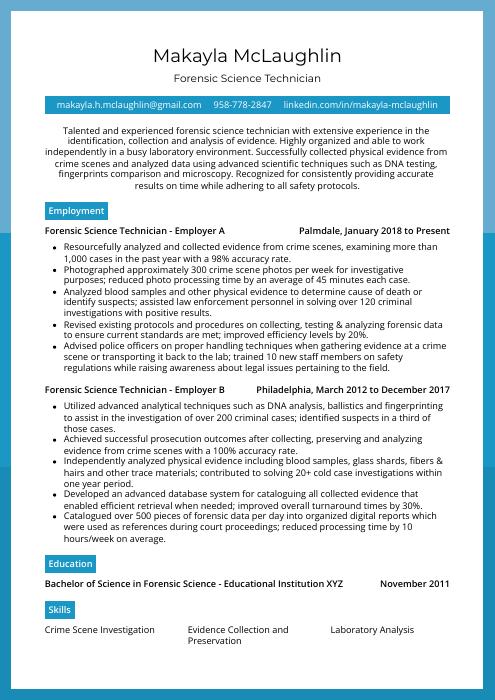 Rhea
Rhea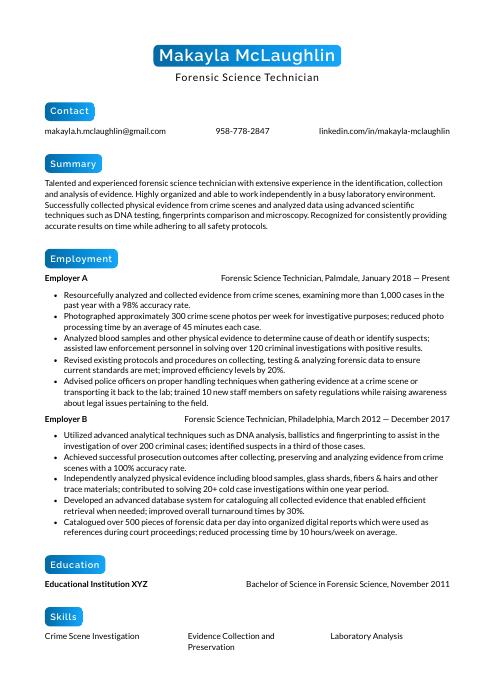 Kinkajou
Kinkajou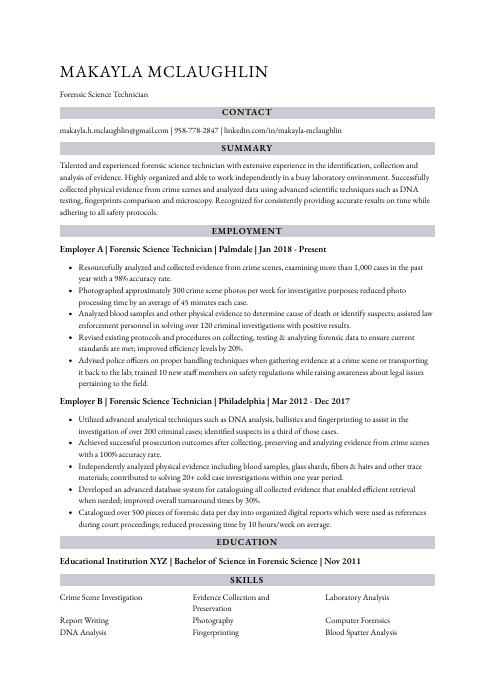 Numbat
Numbat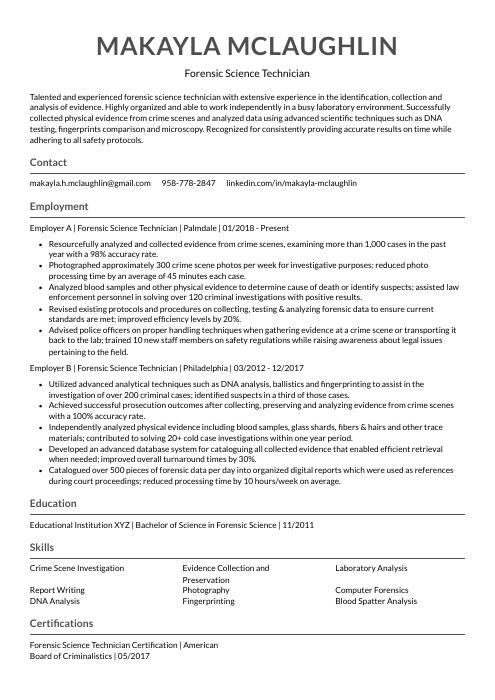 Indri
Indri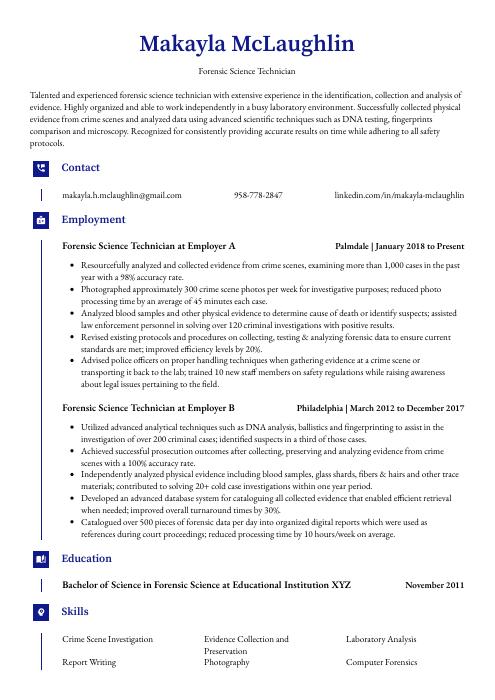 Gharial
Gharial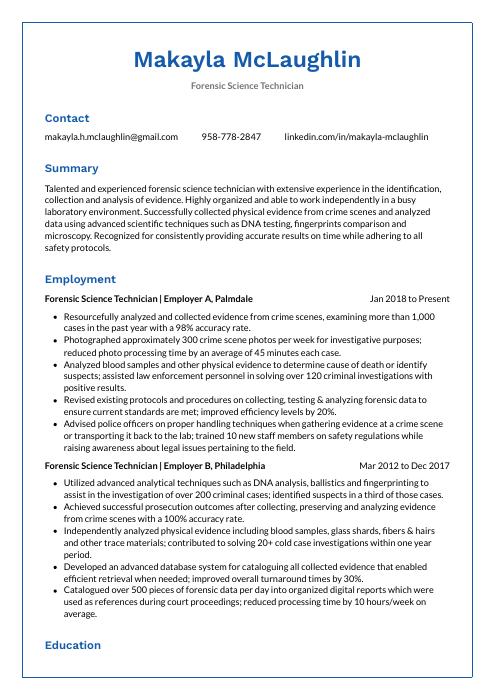 Markhor
Markhor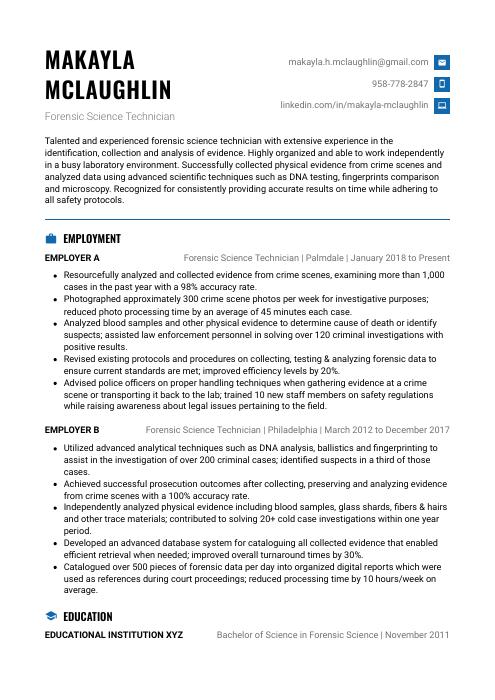 Echidna
Echidna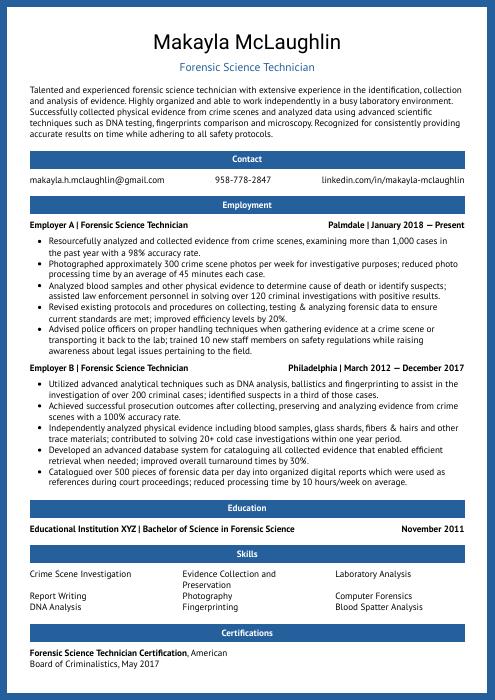 Ocelot
Ocelot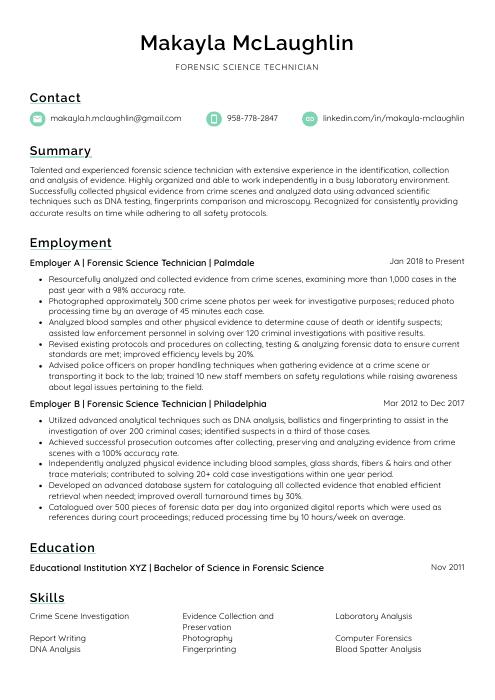 Lorikeet
Lorikeet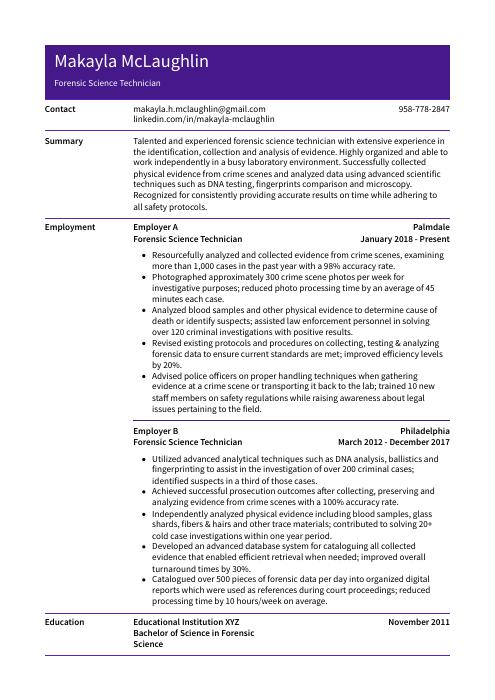 Pika
Pika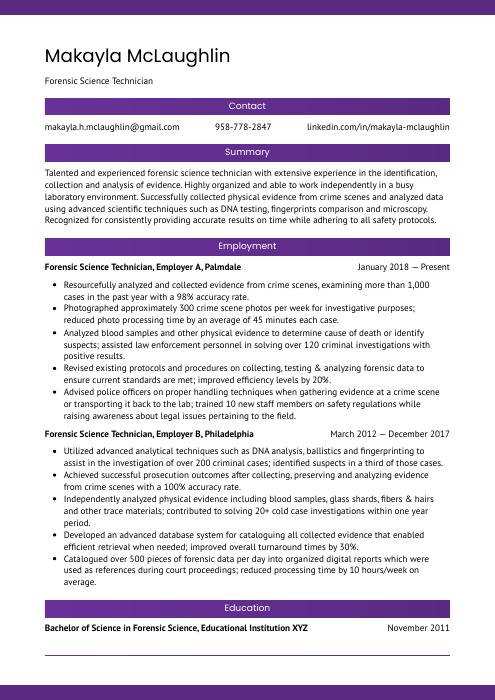 Jerboa
Jerboa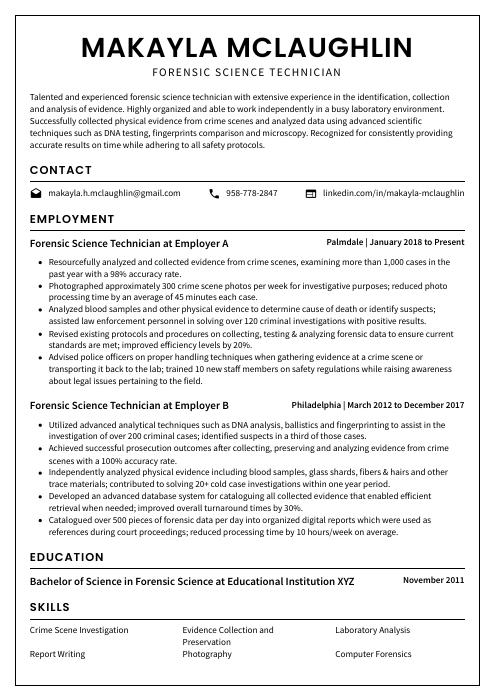 Cormorant
Cormorant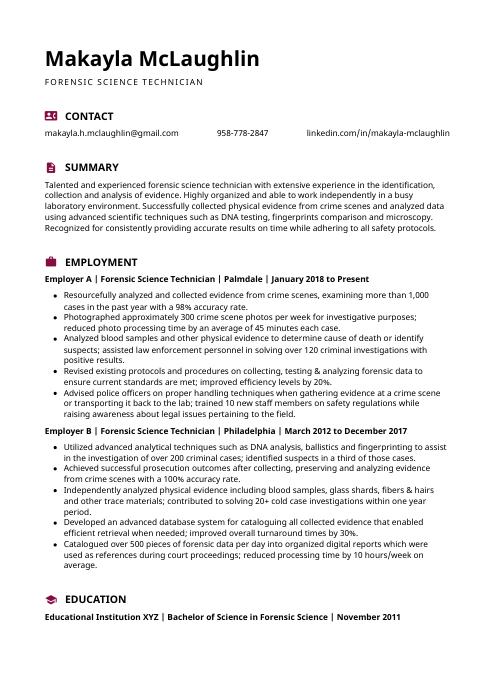 Hoopoe
Hoopoe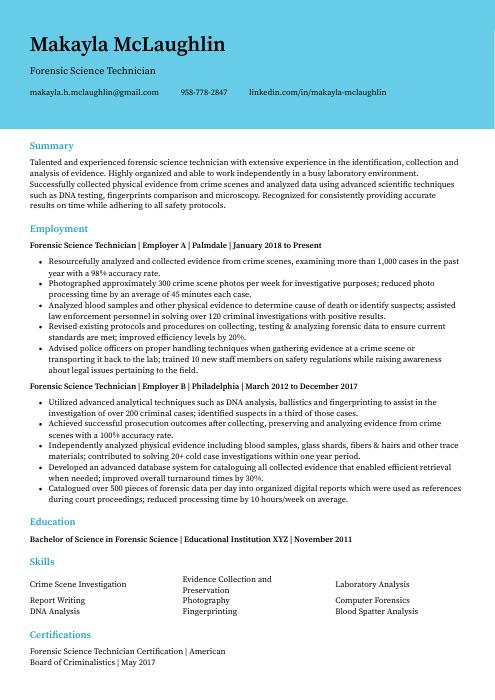 Dugong
Dugong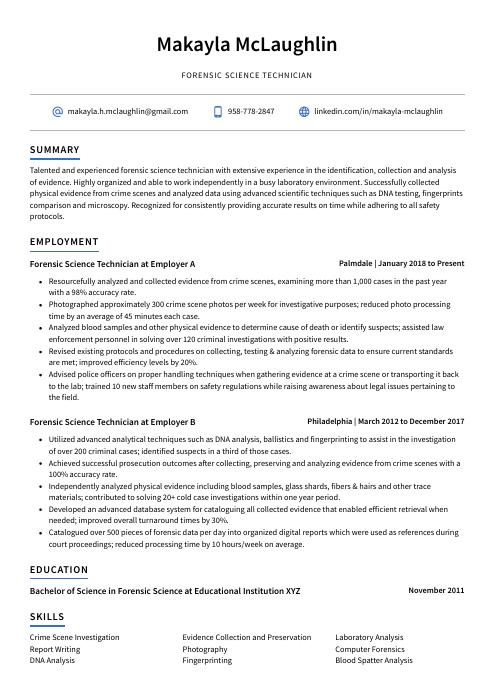 Axolotl
Axolotl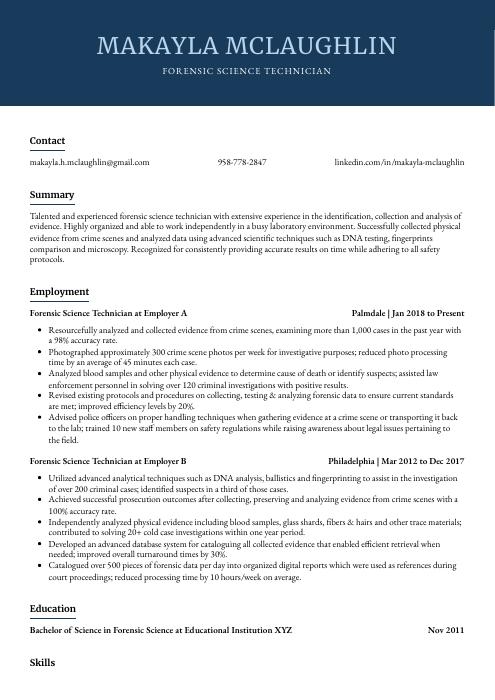 Bonobo
Bonobo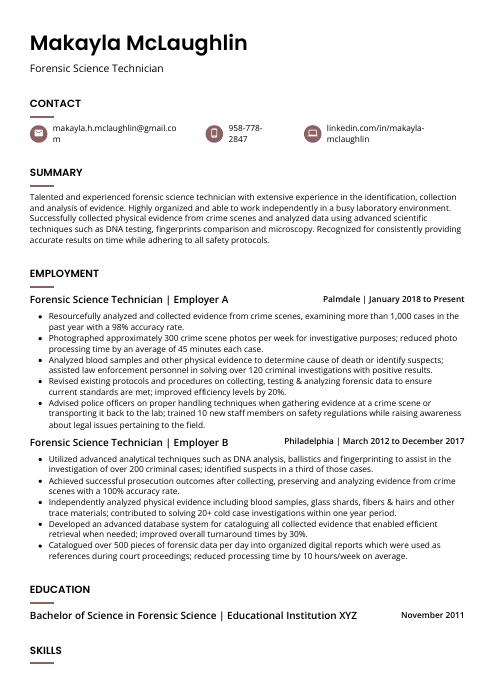 Fossa
Fossa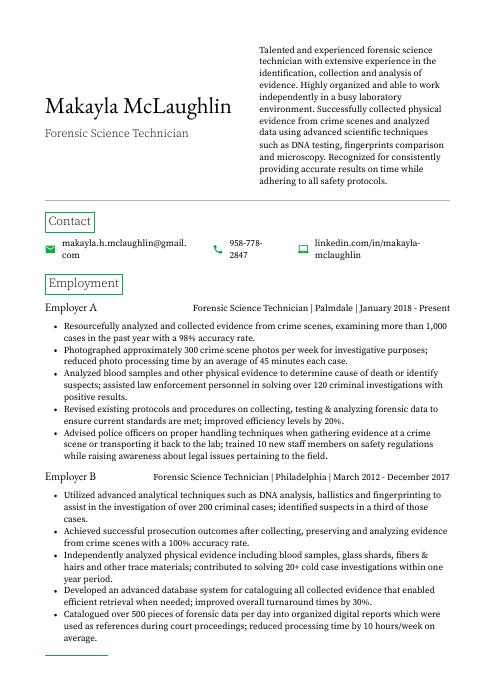 Quokka
Quokka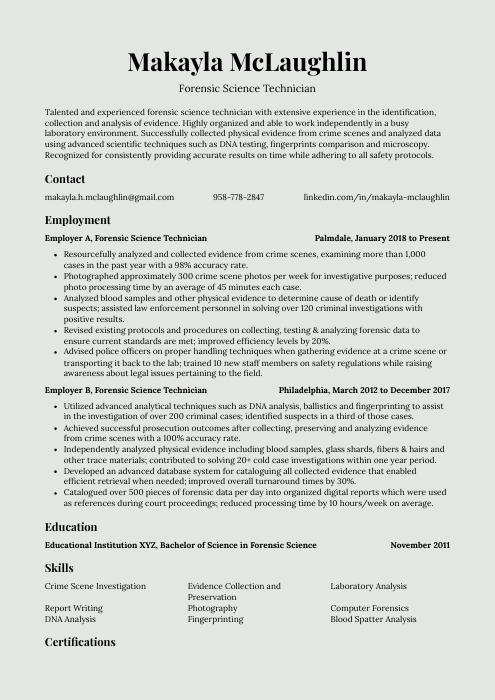 Saola
Saola Rezjumei
Rezjumei
